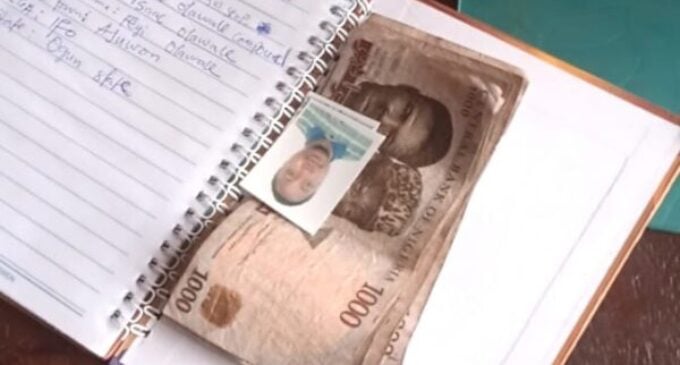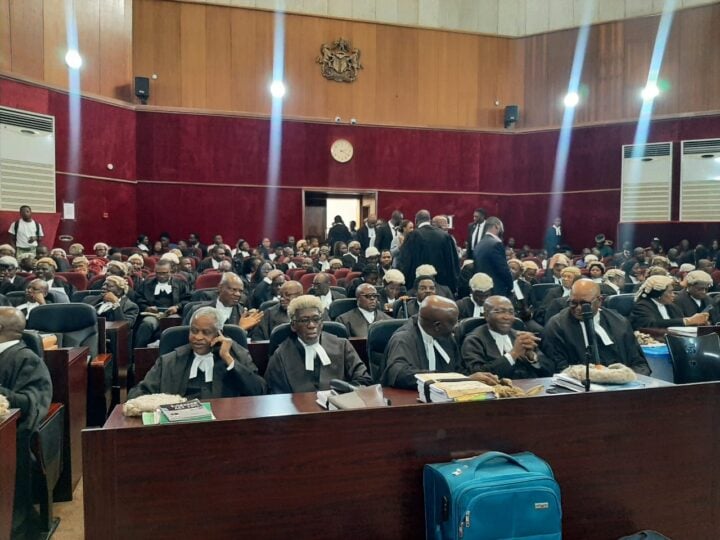A certificate of origin is an essential document in Nigeria. From job placements to admission into educational institutions and political appointments, the certificate, issued to only indigenes of a particular state, validates that one is indigenous to a community in the area. It is like a password to many opportunities in the country.
In spite of its relevance, TheCable’s JAMES OJO and SAMAD UTHMAN uncovered how public officials in some LGAs across the country are issuing the certificate for a fee to non-indigenes, foreign nationals – and even non-existent people – in violation of the law.
It was 8 am on February 13, 2023. The atmosphere bustled with the blaring horns of cars and motorcycles as commuters geared up for the day’s activities. The reporter walked into the liaison office at Akute, Ifo LGA of Ogun state, to request a certificate of origin.
Using Olawale Ayo James – a non-existent name, a fictitious address and family compound name, date of birth, and non-existent parents – the reporter presented himself as a young graduate in need of the document for juicy employment.
Advertisement
“Your money is N10,000,” Folashade, a woman at the office, told the reporter.
“Input your details there (referring to a note offered to the reporter). We need your father’s and mother’s names, address, LGA, state, name of father’s compound, and two passport photographs. With these, you are good to go.”
This should be a thorough process considering the significance of the document requested. However, the experience at the LGA office was far from ideal.
Advertisement
“If you agree, let me call Yusuf, he will tell you when to come back for it,” she added.
After haggling over the price on the phone for a while, Yusuf instructed Folashade to get the reporter’s details as well as the agreed sum of N8,000. He asked the reporter to come back for the certificate in a few hours.
Yusuf is the liaison officer in charge of certificates of origin, birth certificates and other official documents at the office. The reporter had informed Yusuf that he was not from Ogun, but only needed the certificate to get a job, he did not bat an eyelid. Only one thing mattered – the N8,000.
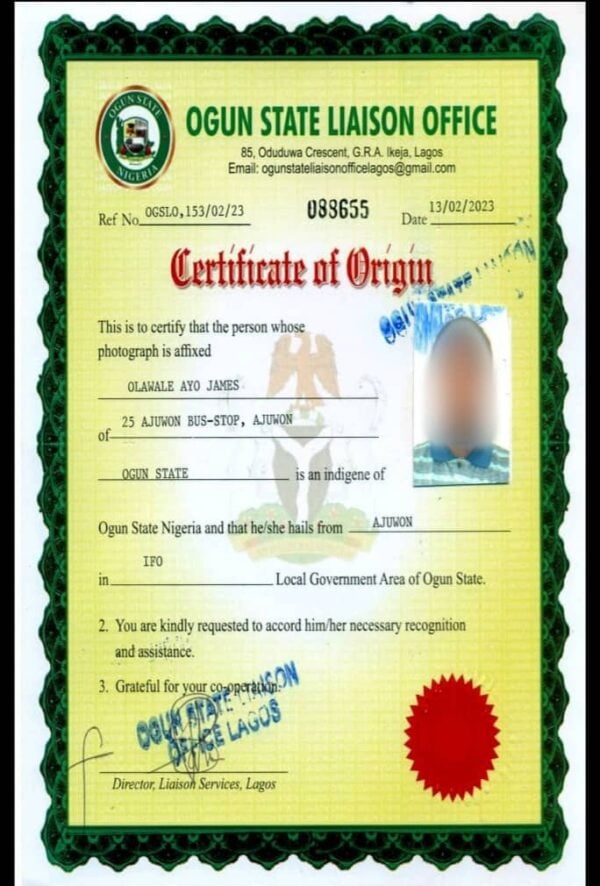
The document says the fictitious applicant “is an indigene of Ogun state from Ajuwon in Ifo LGA” and should be accorded the “necessary recognition and assistance”.
Advertisement
“Usually, I ask people to submit their details and come back for the certificate the next day because it has to be signed, but I did yours because you told me you need it for an interview,” Yusuf told the reporter at a fast food joint where he asked him to come for the document.
At Sagamu LGA, the reporter did not find the process as easy as it was with Yusuf. He had barely entered the gate when he was faced with a series of questions bordering on the purpose of his visit to the facility.
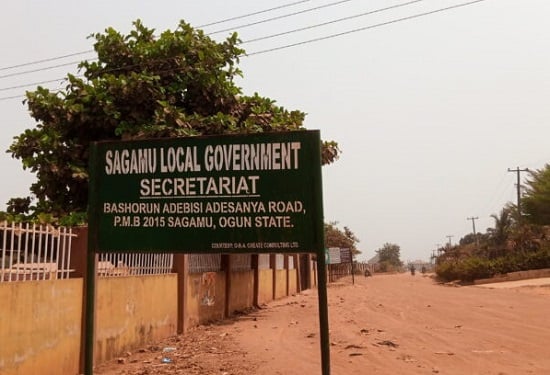
The atmosphere was a bit relaxed when the reporter disclosed he was there to get a certificate of origin for a friend.
“It’s N4,200, but you cannot collect on behalf of anyone. Also, be ready to answer questions asked by the officials. If you falter, you will not be attended to,” Abideen Olaiya, an official at the LGA, told the reporter.
Advertisement
His remark heightened the reporter’s fears due to the fact that the supposed friend – Ogunbawowo Busola Mary – was non-existent. The supposed friend’s father’s name (Ogunbamowo Isaac), family compound (Ogunbamowo Isaac compound), mother’s name (Gloria Ogunbamowo), and the given address – 25, Ikenne Road, Ilaye, Sagamu – were all fictitious.
In spite of the initial impression that a thorough check would be carried out before issuing the certificate, the process turned out to be an easy ride after paying an extra N4,000 to Olaiya and N500 to another staff at the LGA.
Advertisement
The reporter obtained an official certificate indicating that the non-existent Mary was a “native of Sagamu LGA”. Even though the reporter did not submit any document to prove the identity of Mary, the certificate claimed: “ancestral, historical, and administrative records verified by the local government attested to this fact”. The certificate, dated February 14, was signed and stamped by the secretary to the LGA as well as the LGA chairman.
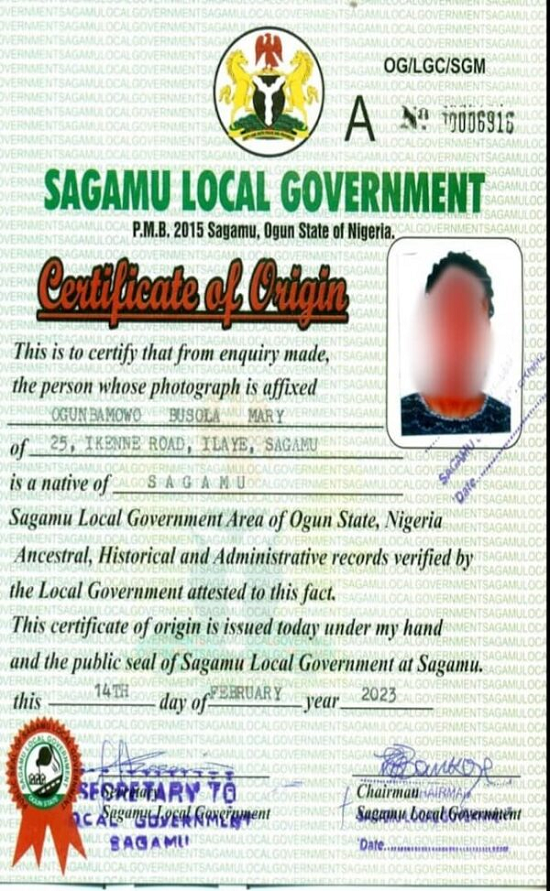
At Ewekoro LGA, the situation was the same – no due process and no official document required. The reporter was asked to pay N12,000 and thereafter forward his address and passport photograph to get the certificate of origin – despite clearly indicating that he was not from the state and only needed it for a job.
Advertisement
In Nigeria, a certificate of origin is a prima facie evidence of the holder’s state of origin which a person claims. According to the guiding principles of the Federal Character Commission (FCC), an indigene of an LGA is anyone “accepted” as such by the local government. This leaves enormous discretionary powers in the hands of LGA officials.
Federal and state institutions also request the certificate to effect the catchment system for the even distribution of admission quota among states. The certificate of origin also affects differences in school fees and bursary allocation for indigenes and non-indigenes.
Advertisement
THE LAGOS EXPERIENCE
It was just another day in the office for Biodun who works around the Nigerian Immigration Service (NIS) office in Alausa, Ikeja, Lagos.
Biodun is literally a jack of all trades for issues that concern passport application, issuance and collection. He knows the right plug for every deal – mostly done through the back door.
When the reporter inquired how he could get a certificate of origin to apply for a job, the plum, Abiodun’s name rang a bell to everyone around the NIS passport office.
“It’s not a big deal, I can do it for you. You just have to pay N10,000 since you are from Lagos. If you are a non-indigene, you will have to pay N12,000. I can do Alimosho LGA for you. Is that okay?” he asked.

By law, certificates of origin should only be issued to certified indigenes of an LGA; but according to Biodun, anyone can get it for a fee.
After a few minutes of haggling over the price, the reporter agreed to pay N10,000. With that settled, he called his plug at Alimosho LGA and asked the reporter to come back by 2 pm the next day.
Biodun did not ask the reporter for any document to facilitate the certificate; and true to his words, the certificate was ready the next day. The certificate, signed by Dare Ogunkoya, secretary to Alimosho LGA, on behalf of the chairman, “confirmed” that the reporter – who is not from Lagos state – is an indigene of the LGA and should be accorded “necessary assistance”.
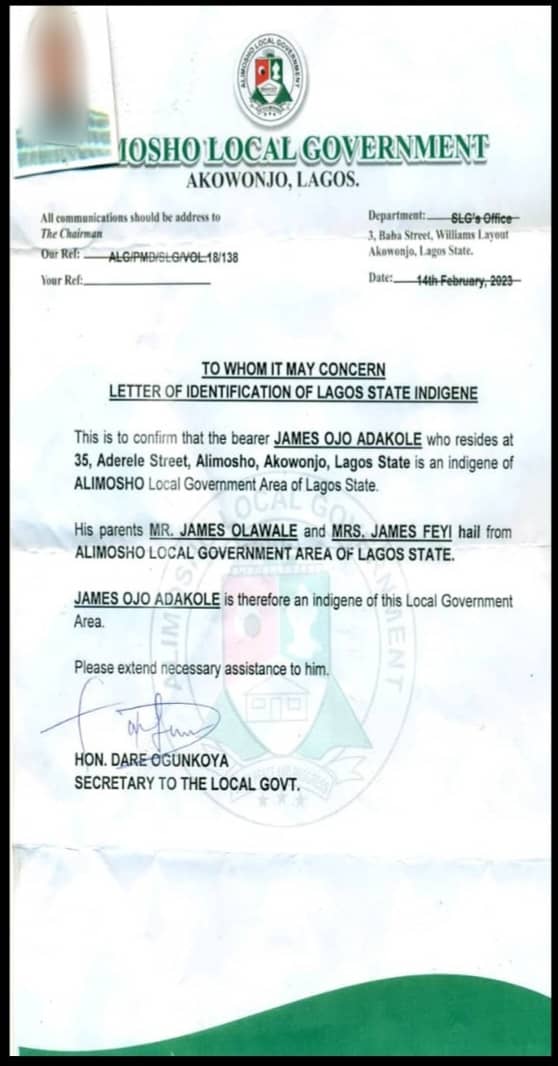
The experience with Biodun showed that getting a certificate of origin through the back door was a possibility at Alimosho LGA. When the reporter eventually visited the LGA, the practice was prevalent. The reporter had barely alighted from the car when one Sarah approached him and took him to a section of the facility that she and other colleagues were using for their operations.
“This is the easiest method to get it. If you are to go through the normal process, it will take you a lot of time,” she said, trying to convince the reporter.
Sarah then handed the reporter a plain sheet to input his details. “Your money is N8,000,” she said.
After an intense plea from the reporter, she agreed to take N7,000 which will be sent to a designated account number. Sarah’s countenance was that of someone who just hit a jackpot. Beaming with a smile, she offered the reporter a seat and zoomed off with his details to process the certificate.
To further test the strength of the process of issuing certificates at the LGA, the reporter used fictitious names – the same details submitted at Ifo LGA in Ogun state. But the outcome was the same as that of Biodun, no thorough check was done.
In less than an hour, Sarah returned with a certificate of origin also signed by the same Ogunkoya certifying that the reporter and his parents “hail from Alimosho LGA” and should be given “necessary support”.
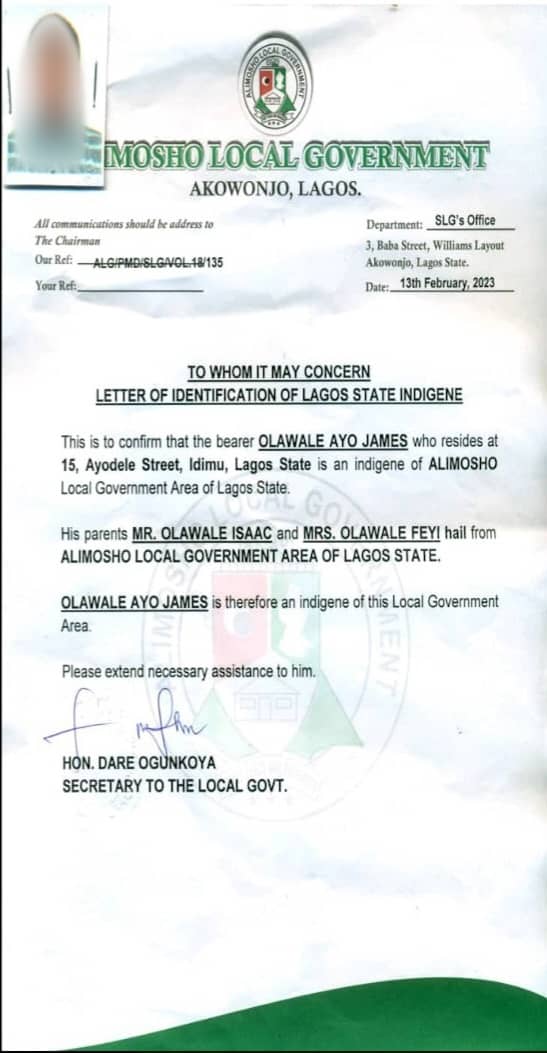
“The certificate is original; you can see it was officially signed,” Sarah told the reporter when he sought to confirm the authenticity of the document.
Excited to have completed the process without hitches, Sarah gave her phone number to the reporter and asked him to call when in need of other services at the LGA.
“I also do car documents – driver’s license, number plate, everything you need,” she added.

At Somolu LGA, the experience was not different – extortion and backdoor activities were prevalent with no proper background check of presented names. The two men who approached the reporter at the LGA asked him to pay N7,000 and provide two passports to get the certificate – with no mention of any official document.
THE IKEJA, OSHODI-ISOLO LGAs EXCEPTION
The reporter’s experience at Ikeja and Oshodi-Isolo LGAs was a sharp contrast to the other LGAs visited across Ogun and Lagos states.
Linus, as he simply identified himself, was the officer in charge of issuing the certificate of origin in Ikeja. When the reporter entered his office, located within the ministry of special duties and intergovernmental relations section, the simple but firm official insisted on getting valid means of identification and other essential documents before issuing the certificate.
“Do you have a letter from the Oba (king) of your town or a letter from the local government?” he asked, gazing intently at the reporter.
“You have to provide a birth certificate as well as your National Identification Number (NIN) slip or Lagos State Residents Registration Agency (LASRRA) card. Preferably, we want your LASRRA card since it has to do with the state. The essence of all these is to be sure of the name. If you have the necessary documents, then bring two passport photographs and pay N2,000 to the state government.”
The reporter, sensing the official was becoming more suspicious, asked if he could get the certificate without the listed documents while he feigned he needed it to complete an urgent job application.
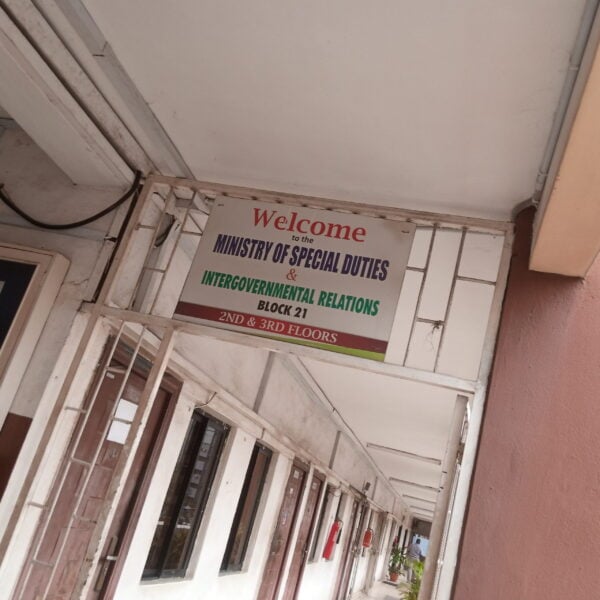
But Linus would not change his stance.
“Which of them do you have exactly? There’s no way I can help you; if you don’t have any of the documents here, ask someone to send them to you via email or WhatsApp, and you can print them around. It should be very easy for you,” he concluded.
Realising the insistence on due process, the reporter headed for the exit door, promising to come back for the certificate.
At Oshodi-Isolo LGA, the reporter also observed an improvement in the process. The female official in charge of the certificate asked the reporter to provide his birth certificate, two passports, compound name, and his mother’s maiden name, and pay N7,500 to get the document.
The official did not shift her ground on the demands for documentary proof.
Meanwhile, there are reported cases of people getting jobs, admissions, and appointments by randomly obtaining certificates of origin for states they are not from.
In 2017, for instance, the Kwara state government uncovered 67 persons recruited into the Nigerian army between 2010 and 2016 with fake certificates of origin from the state. They were said to have been exposed through their names and inability to communicate in the languages of the LGAs they claimed.
In 2019, Olamide Olakunlade, a 23-year-old indigene of Ekiti state, was arrested and arraigned in Lagos for allegedly forging an Ikeja LGA certificate of origin to apply for an air force recruitment programme.
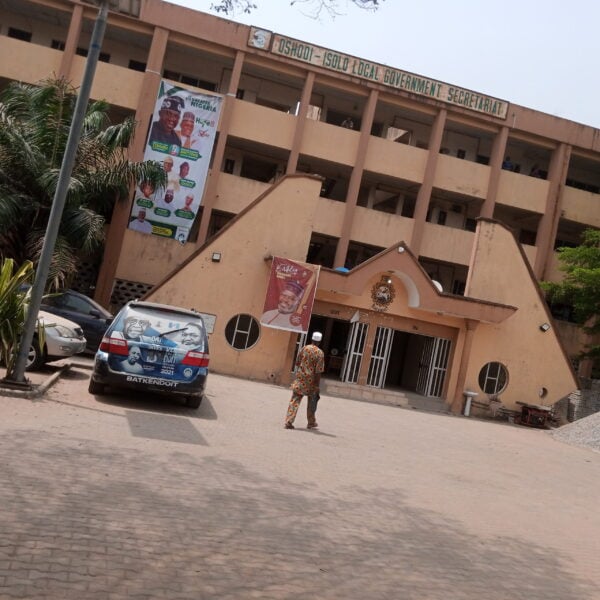
If the certificates can be obtained without hassle – as the reporter experienced – it means the country’s federal character principle and appointment/job distribution is under threat as anyone can claim to be an indigene of a state for a fee.
But this anomaly is not prevalent in the southern part of the country alone. In the north, the situation is also grim and reckless.
